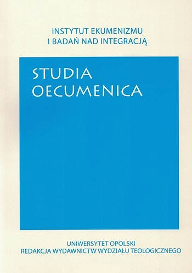Ecumenical education of children and youth according to “The religious education core curriculum of the Catholic Church in Poland” (2018) and “The curriculum for the Roman Catholic religious instruction in kindergartens and schools” (2018)
Ecumenical education of children and youth according to “The religious education core curriculum of the Catholic Church in Poland” (2018) and “The curriculum for the Roman Catholic religious instruction in kindergartens and schools” (2018)
Author(s): Jerzy KostorzSubject(s): Christian Theology and Religion, Education, Theology and Religion, Comparative Studies of Religion
Published by: Uniwersytet Opolski
Keywords: ecumenism; catechesis; education; dialog; attitude; formation; catechetical instruction; core curriculum; program for catechesis;
Summary/Abstract: The article presents an ecumenical education in the light of new core curricula for the religion education at schools and kindergartens. These documents were accepted and approved in 2018 and will take effect on the 1st of September of 2020. Currently one can see ongoing work on new series of workbooks. The aim was to notice and detect, whether or not, new documents and propositions within can inspire catechists and teachers to explore and become familiar with an ecumenical education. Goals and contents of the new core curriculum of the religious education for the Catholic Church in Poland of 2018 for kindergartens and schools were carefully analysed, described and presented. It was done with the focus on ecumenical education. It was observed that the very idea of the ecumenism was treated lightly in aforementioned documents. The authors addressed this idea rarely and sparsely. Clear and concrete description of main foundations of the ecumenical formation were also not observed. The authors of analysed documents don’t put any stock in forming attitudes such as attitude of dialog, openness or respect, or so it seems. According to them, the main focus of religious education should be on history of the Church and general concepts and usual terms (i.e. divisions within the Church, attempts to undertake a dialog, etc.). All of these can create particular challenges and difficulties for those who work on new workbooks to include ecumenical education in its fullness.
Journal: Studia Oecumenica
- Issue Year: 2019
- Issue No: 19
- Page Range: 129-141
- Page Count: 13
- Language: English, Polish

